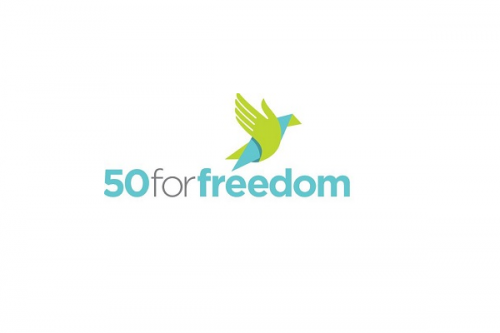
The 50 for Freedom Campaign is led by the International Labour Organization and its partners, the International Trade Union Confederation and the International Organization of Employers.
https://50forfreedom.org/the-protocol/
A TREATY TO CHANGE 25 MILLION LIVES
Sign up to support the 50 for Freedom campaign and help millions of children, women and men reclaim their freedom and dignity.SIGN ME UP
MODERN SLAVERY: MYTHS & FACTS
Modern slavery is all around us, but most people don't even realize it. Learn the truth about these common myths and then sign up to help end modern slavery for good.SIGN ME UP
MYTH: SLAVERY IS A THING OF THE PASTFACT: No, it is not. Slavery has ancient roots in history and still exists today in many different forms. Although it is not defined by law, “modern slavery” is used to describe situations where someone is forced to work or marry and cannot refuse or leave because of threats, coercion, violence, deception, etc. Human trafficking, bonded labour and forced domestic work are just a few examples of forced labour. But that doesn’t mean it’s inevitable. A coordinated effort by governments and activists around the world could end forced labour for good. That’s what the ILO’s Protocol on Forced Labour is all about. |
 |
MYTH: RELATIVELY FEW PEOPLE ARE VICTIMS OF FORCED LABOURFACT: There are more people in slavery today than at any other time in history. More than 40 million people around the world were victims of modern slavery in 2016, including about 25 million in forced labour, and 15 million in forced marriages. If they all lived together in a single city, it would be one of the biggest cities in the world. Sources: |
 |
MYTH: FORCED LABOUR ONLY HAPPENS IN THE DEVELOPING WORLDFACT: Forced labour happens in every country in the world. More than one and half million people work in slavery-like conditions in Europe, in North America, in Japan and in Australia. Sources: |
 |
MYTH: SEX TRAFFICKING ACCOUNTS FOR MOST CASES OF FORCED LABOURFACT: Around one in five are victims of sexual exploitation. Most of the people in slavery work in industries such as agriculture, fishing, construction, manufacturing, mining, utilities and domestic work. |
 |
MYTH: FORCED LABOUR ISN’T A BIG MONEY-MAKERFACT: Forced labour is huge business. A recent ILO study estimated that forced labour generates annual profits of over US$ 150 billion, which is as much as the combined profits of the four most profitable companies in the world. Sources: |
 |
MYTH: FORCED LABOUR DOESN’T AFFECT MEFACT: Forced labour affects everyone. Even if you’re not a victim of forced labour, you’re still affected by it. Businesses, for example, face unfair competition from unscrupulous companies who reap the profits of forced labour. That may put pressure on them to lower wages or cut benefits. Meanwhile governments lose out on precious tax revenue while facing huge legal costs from prosecuting forced labour cases-money which could be spent on public services like education, healthcare or public transportation. |
|
MYTH: MOST OF THE MONEY FROM FORCED LABOUR IS MADE IN THE DEVELOPING WORLDFACT: The annual profits per victim of forced labour are far, far higher in developed economies and the European Union than they are anywhere else in the world. Sources: |
 |
MYTH: THERE ISN’T VERY MUCH I CAN DO TO HELP PEOPLE TRAPPED IN FORCED LABOURFACT: You can play a part in the fight to end slavery. It is up to governments to enact and enforce legislation, protect their citizens and ratify the Protocol on Forced Labour. And you can make sure that happens by showing you care.
Check out our Campaign Toolkit for more ideas on how to help |
 |
- 1832 reads
















Add new comment